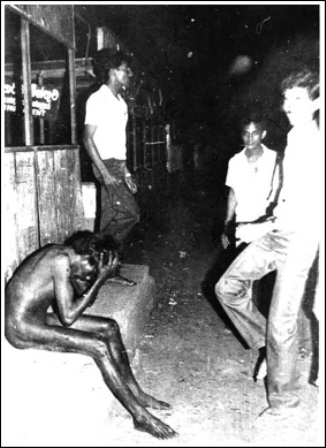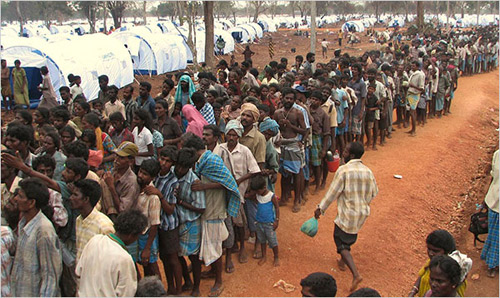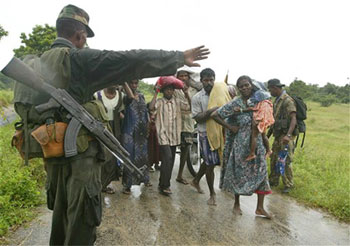Ilankai Tamil Sangam29th Year on the Web Association of Tamils of Sri Lanka in the USA |
|||
 Home Home Archives Archives |
Tyranny of the Majority since 1948by Roy Ratnavel, TamilCanadian, February 3, 2012
Thugs — they came during the day and in the night, by the hundreds. In the first hours of July 24, 1983 — one day after a deadly ambush by Tamil Tigers which killed 13 Sri Lankan Army soldiers. Day of infamy — a 9/11 if you will — for Sri Lanka’s Tamils. As the days ensued, Tamils were targeted on the capital When it was over, almost 3,000 members of the country’s Tamils lay dead due to the handy work of government orchestrated mobs. Homes and businesses of Tamils were looted and destroyed, over one million Tamils went into exile — many in Canada. To date, not a single perpetrator has been brought to justice. Few brave Sinhalese who protected Tamils from this unimaginable savagery — the few righteous ones on the island, represent a flickering spark of humanity in a country that had gone dark. ‘Black July’ — as it came to be called still ranks as one of the gruesome assaults suffered by the Tamils of Sri Lanka since its independence. Lawlessness reigning; where were the police, the safeguard of liberty? Marked by Sri Lankan law-enforcement’s quotidian boredom during this grotesque spectacle and the odd twists of fate, set the Tamils on the road to revolution in Sri Lanka resulting in an unconscionable outcome. Ironically, in July, 1983, then-president of Sri Lanka, J.R. Jayawardene, told Ian Ward of London's Daily Telegraph, “I am not worried about the opinion of the Tamil people, now we cannot think of them, not about their lives or their opinion ... really if I starve the Tamils out, the Sinhala people will be happy.” His angry bravado is clearly reminiscent of the 1980s, when such callousness created more Tamil Tigers than it destroyed.
The current situation in Sri Lanka has an important contemporary-historical context. Prior to 1983, history already lay heavily on the Sri Lankan civil war. The war partly continued from an earlier conflict, the doomed effort by the British during 1948 to discontinue Sri Lanka as an imperial possession and delivering its independence on February 4th. The transfer of power to those representing Sinhalese — a majority group in Sri Lanka — created a volatile situation and sent the country on an irreversible ugly path. For Tamils, it marked the beginning of the end of freedom. Soon after the British left behind Sri Lanka’s rich tea crops in the mellifluous mountains, picturesque pristine beaches, its precious stones — Sapphire and Garnet, in the name of Sinhala nationalism, Sri Lanka’s first Prime minister, enacted discriminatory laws against Tamils which has overtime turned this nation into hell on earth for Tamils. Instead of sunshine in independent Ceylon — as formerly known, darkness set on divided Lanka. This is a political clash, not a battle between “bloodthirsty tribes.” Such a portrayal only serves to reinforce misconceptions that have taken decades upon decades to deconstruct. A political conflict in a nation where politics has been divided along ethnic and cultural lines. And those carrying out the acts have been sufficiently radicalized along ethnic and cultural allegiances. It is not to suggest that it’s a Sinhalese characteristic. It’s not a Sinhalese characteristic at all. It’s practiced in many parts of the world at different times. Violence is unleashed on ethnic groups by people who are determined to kill all the adversaries whether they are innocent or guilty. But these policies come from the people at the top in an organization — in Sri Lanka’s case, from the Sinhalese politicians of highest order. At the height of the Vietnam War, Republican Senator George Aiken of Vermont once told President Lyndon Johnson that, “I’m never keen for doves or hawks. I think we need more owls.” In Sri Lanka, owls, alas, so far have not ruled the country since the independence. Hawks, there have been a-plenty, and a disastrous mess these hawks have made in Sri Lanka, from which no easy escape beckons. Sri Lanka is often referred in the Western press as a democracy. Yet Sri Lankan politicians of many stripes and generations practiced and justified by bluntly stating that Sri Lanka is a Buddhist state for Sinhalese only, that these are “the grounds by which Sri Lankan democracy operates,” and “if you don’t buy into the rules of the Sinhala-Buddhist state, and then don’t play.” A country that has no constitution guaranteeing the rights and freedoms of all its citizens, regardless of their beliefs, is not a democracy. Sri Lanka is a democracy only in its most slovenly application, and even if it is a full, blazing beacon of a democracy, the category offers no protection or excuse for what that ‘democracy’ so gruesomely did to Tamils since 1948. Sri Lanka’s victory over Tamils in May 2009 was indeed a stupendous victory for ‘barbarism’ — not for democracy. Barbarism remains barbarism, even when it is tacitly supported by other ‘democracies,’ and even when it is a sugar-coated war run on slogans. The courage of the Tamil people, during decades of this slow cultural genocide and devastation, represents the highest aspirations of the human spirit. Meanwhile, the brutality from the dawn of Sri Lankan independence — torture, mass killings, disappearances and indiscriminate aerial bombardment — is a legacy of man’s inhumanity to man. There is little to celebrate in a country where majority of the population lives below the poverty line, many schoolchildren suffer from malnutrition, basic services still remain rudimentary and general standard of living is on the decline for most. Huge number of people have fled abroad to seek better opportunities and to do better things with their money, resulting in capital and brain drain. Rule of law is absent for the most part. Political opponents, insufficiently loyal followers, independent journalists and people of the wrong ethnic background have a habit of winding up dead, imprisoned, impoverished or in exile from this independent Sri Lanka. Against this bleak backdrop, other than the brainwashed or the brain-dead, it is hard to find sane Sri Lankans who feel those 64 years of independence is a matter for rejoicing. Since the independence on February 4th 1948, Sri Lanka has proven to be good at only one thing — ‘ethnic politics.’ It would be accurate to say that if Olympic medals are awarded for poor governance, Sri Lanka would take the gold, silver and bronze. But what is less accurate is the lack of Sri Lanka’s reputation that it is a terror state whose predatory territorial aims are anchored in intolerance, discrimination and destruction of the Tamil minority.
Whatever the case may be, one thing is clear. What happens in Sri Lanka will begin to matter more and more to Tamils abroad. Hunger for ‘freedom and dignity’ still remain a powerful magnet for humanity as they are as much a prerequisite for democracy as voting. Tamils’ emotions, no matter how much we have tried to jimmy them into seeing things another way, will not budge because Sri Lanka’s evil unleashed on Tamils since the independence cannot be undone. But by dismissing Sri Lanka’s twisted logic for the poisonous nonsense it is, we can act to ensure it does not metastasize into the marketplace of ideas. Strongest proponents of freedom in society suggest — individual political and economic freedom — as the only way towards economic development and long-lasting peace. In the absence of fundamental political change, peace will never be possible in this post-independent Sri Lanka. In 1948, when Sri Lanka got its independence, it was considered to be the post-colonial nation most likely to succeed economically and democratically. Unfortunately, since then Sri Lanka has been governed by leaders with a penchant for racial hatred. Through their hatred, they have destroyed the country. Sri Lanka is sick with racial tendencies — and, political and economic freedom for Tamils from the clutches of its tyranny is the only antidote. Tamils will keep saying this, and say it against all odds and all organized powers. When the time comes, to anyone who will listen, to everyone who won’t listen, and — above all — to us, when no one will listen. roy_ratnavel@hotmail.com
| ||
 streets of Colombo as they went about their day, inside busses on the way to work, at their businesses. Even while they were sleeping in their own homes — it didn’t matter. Homes were identified in spectacular Nazi-efficiency with the help of voters-list distributed by the government. The smashing of doors and windows, hinges flying in the midst of screams from inside and outside, even the pitter-patter of terrorized infants feet didn’t matter against the screeching thud of vicious thugs drunk on anti-Tamil rage.
streets of Colombo as they went about their day, inside busses on the way to work, at their businesses. Even while they were sleeping in their own homes — it didn’t matter. Homes were identified in spectacular Nazi-efficiency with the help of voters-list distributed by the government. The smashing of doors and windows, hinges flying in the midst of screams from inside and outside, even the pitter-patter of terrorized infants feet didn’t matter against the screeching thud of vicious thugs drunk on anti-Tamil rage.
 Even today, after the end of three painful decades of horrific war, the inherent safeguards against the “tyranny of the majority,” so inalienable rights of a minority aren’t protected against the whims of the majority in Sri Lanka. As recently condemned by Canadian foreign minister John Baird, “...to date, we have seen a lack of both accountability and meaningful attempts at reconciliation on the part of the Sri Lankan government…The Government of Sri Lanka must demonstrate the principles of freedom, democracy, human rights and the rule of law.” Tamils welcome this shift in Canadian foreign policy which pursues an agenda of combating such flawed democracy and showing support for leveling the playing field for the disenfranchised in Sri Lanka.
Even today, after the end of three painful decades of horrific war, the inherent safeguards against the “tyranny of the majority,” so inalienable rights of a minority aren’t protected against the whims of the majority in Sri Lanka. As recently condemned by Canadian foreign minister John Baird, “...to date, we have seen a lack of both accountability and meaningful attempts at reconciliation on the part of the Sri Lankan government…The Government of Sri Lanka must demonstrate the principles of freedom, democracy, human rights and the rule of law.” Tamils welcome this shift in Canadian foreign policy which pursues an agenda of combating such flawed democracy and showing support for leveling the playing field for the disenfranchised in Sri Lanka.